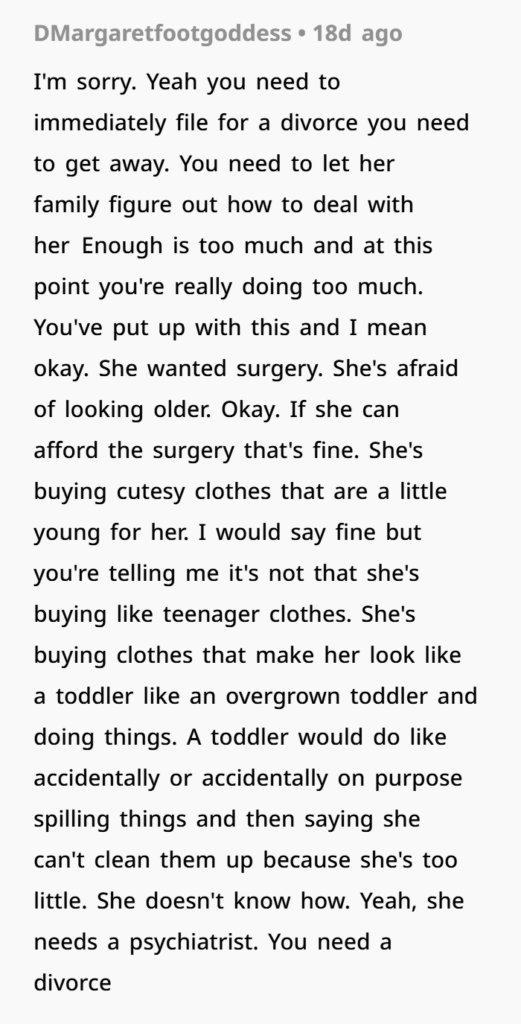My Wife Started Acting Like a Child — So I Divorced Her

In this distressing and emotionally complex Reddit post, a 28-year-old man shares his decision to divorce his wife after four years of marriage due to her escalating obsession with appearing and acting like a young child. He recounts how his wife initially admired Asian features and underwent surgeries to emulate them, despite his reassurances that she was already perfect. Over time, however, her transformation intensified—she began dressing in toddler-like clothes, roleplaying in Discord using baby voices, and behaving in ways that mimicked childlike helplessness, including intentionally making messes.
What began as aesthetic changes evolved into a lifestyle that her husband found disturbing and inappropriate, particularly given his strong discomfort with infantilization. When he confronted her, she accused him of being controlling, and the relationship hit a breaking point. He ultimately chose to divorce her, only to be met with backlash from her parents and friends who accused him of failing to support her. Now, he’s seeking advice on whether his decision was justified or if he overreacted.
Advertisement – Continue Reading Below
Most people’s obsessions are harmless, but this guy’s wife took hers a bit too far for his liking

Advertisement – Continue Reading Below
She’s infatuated with the idea of looking, and acting, like an Asian child, even though she’s Caucasian\

Advertisement – Continue Reading Below

Advertisement – Continue Reading Below

Advertisement – Continue Reading Below

Advertisement – Continue Reading Below
1. The Psychology Behind Age Regression and Infantilization

Advertisement – Continue Reading Below
At the core of this conflict lies a practice that sits on a controversial psychological spectrum: age regression, and more problematically in this case, infantilization. Age regression is a coping mechanism some adults use during trauma or stress, where they behave or dress in a childlike manner to feel safe or nurtured. In clinical contexts (especially in trauma therapy), this is a recognized if rare therapeutic behavior—when consensual and controlled.
However, when age regression enters the realm of lifestyle choice and public behavior, especially without boundaries or mutual understanding in a relationship, it can become disruptive. In the OP’s case, his wife’s actions appear to go beyond coping strategies. Her participation in Discord communities that involve baby talk, the deliberate purchase of toddler-like clothing, and her failure to maintain adult responsibilities suggest this behavior has transformed into a core part of her identity expression—one her husband never consented to or feels comfortable with.
2. Cultural Fetishization and Identity Transformation
The OP also flags that the marriage began with his wife expressing an “obsession with Asians,” leading her to undergo surgeries to change her facial features—particularly her eyes and facial contour. This introduces the issue of cultural fetishization, where a person idealizes or objectifies another’s ethnicity, often reducing them to a stereotype.
Such behavior can be deeply unsettling in relationships. Asian fetishization, sometimes referred to as “yellow fever,” has long been critiqued for dehumanizing and exoticizing individuals, especially in interracial dynamics. The combination of this fetishization with physical alteration—like eyelid surgery to create a monolid look—can point to more complex psychological issues around identity, self-image, and race.
For the OP, this may have raised red flags early on. While aesthetic preferences or plastic surgery can be personal choices, they become problematic when rooted in objectification or mimicry of another culture, particularly when the individual refuses to acknowledge how it affects their partner.
3. Consent and Compatibility in Evolving Identities
All relationships undergo change—but mutual understanding and consent are essential when one partner’s transformation affects the shared life. In this case, the OP clearly communicated his discomfort and tried to set boundaries around behaviors that felt inappropriate or unaligned with his values.
Advertisement – Continue Reading Below
His wife, on the other hand, accused him of being “controlling” and “manipulative.” This brings up a classic dilemma in partnerships: When does setting a boundary become controlling? According to therapist Nedra Glover Tawwab, control is about forcing someone to change who they are; boundaries are about defining what you’re comfortable with and deciding what you’ll tolerate.
By expressing that he is not okay with infantilization, and especially not okay with someone pretending to be a child in private or public, the OP is asserting a clear boundary—not dictating her behavior, but removing himself from it. That’s not control. That’s autonomy.
4. Mental Health Considerations and Red Flags

Advertisement – Continue Reading Below
Some readers might wonder whether the wife’s behavior signals a deeper psychological concern. It’s not uncommon for extreme aesthetic surgeries, persistent body modifications, or age regression behavior to overlap with untreated conditions such as:
- Body Dysmorphic Disorder (BDD): A mental health condition involving obsessive focus on perceived flaws in appearance.
- Identity Disorders or Dissociative Behaviors: In rare cases, dissociative identity disorder or related conditions may manifest as alternate roles, including childlike personas.
- Unresolved Trauma: Age regression is often rooted in childhood trauma or unmet emotional needs.
While it is inappropriate to diagnose someone without clinical input, the behaviors described in the post could indicate that mental health intervention might be beneficial—not just for the wife’s wellbeing, but for any future relationships she may pursue.
5. Public Perception and the Backlash
The OP states that after divorcing his wife “on the spot,” her family and friends condemned him for not supporting her. This raises questions about societal expectations in marriage: Are we obligated to support our partners, no matter how drastically they change?
Advertisement – Continue Reading Below
The answer lies in reciprocity. Emotional support is foundational—but so is compatibility. When one partner evolves in a way that makes the other feel unsafe, uncomfortable, or misaligned with their values, ending the relationship may be the kindest choice for both.
Moreover, the accusation of being unsupportive fails to account for agency. The OP’s wife made choices he clearly voiced discomfort with. When compromise wasn’t possible, he chose separation—not sabotage.
6. Ethical Exit vs. Shock Divorce
One ethical critique may be about the manner of the divorce. The OP says he “divorced her on the spot,” which could be seen as impulsive or emotionally reactive. Ideally, life-altering decisions like divorce should follow structured conversation, counseling efforts, or mutual reflection—unless abuse or a breakdown in safety is involved.
Advertisement – Continue Reading Below
While the divorce was arguably justified, the manner of delivery could have exacerbated tensions with her family or friends. A mediated or planned exit might have softened the social and emotional fallout.
7. Conclusion: Boundaries Are Not Betrayal

Advertisement – Continue Reading Below
No, OP, you are not the villain for drawing a line. Your wife’s evolution into someone who infantilizes herself, fetishizes your ethnicity, and engages in identity transformation you didn’t consent to is more than a quirky phase—it’s a fundamental incompatibility.
A healthy relationship requires aligned values, mutual respect, and emotional safety. When those erode, it’s okay to leave. You can have compassion for her struggles and still walk away. And if those around you don’t understand it, that doesn’t make your decision wrong—it just makes it personal.
Advertisement – Continue Reading Below
Would you like a headline, feature tagline, slug, and meta description for this story too?
In the comments, readers seemed to agree that the original poster was not at fault here, with some advising him to make a figurative run for it

Advertisement – Continue Reading Below

Advertisement – Continue Reading Below

Advertisement – Continue Reading Below

Advertisement – Continue Reading Below

Advertisement – Continue Reading Below

Advertisement – Continue Reading Below






